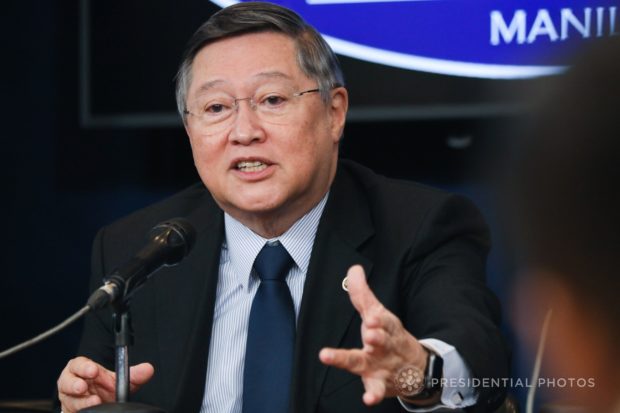
Finance Secretary Carlos Dominguez III. (File Photo by TOTO LOZANO / Presidential Photographers Division)
MANILA, Philippines — What economic challenges will the next Philippine president face? Finance Secretary Carlos Dominguez III on Thursday identified four pressing concerns — ballooning domestic debt, high global inflation, worsening inequality, as well as climate change — that needed to be addressed so the Philippine economy can return to the pink of health post-pandemic.
Dominguez, who heads President Rodrigo Duterte’s economic team, said in a speech that the current administration “will ensure that the next presidency will be ably assisted during the transition period in addressing four key issues that will impact the Philippines’ economic stability.”
“These include ways on how to prudently manage the debt we have accumulated and grow our GDP [gross domestic product] at a rate of higher than 6 percent per annum as we have done,” Dominguez said.
To recall, the government borrowed more amid the COVID-19 crisis due to weaker revenue collections wrought by the pandemic-induced economic slump last year yet higher expenditures needed to give away dole-outs during lockdowns and beef up the health system.
This increase in borrowings jacked up the Philippines’ debt-to-GDP, which reflected an economy’s ability to repay its obligations, to 54.6 percent in 2020 from a record-low 39.6 percent in 2019.
As of end-September, debt-to-GDP further climbed to a 16-year high of 63.1 percent, above the 60-percent level deemed by credit rating agencies as manageable among emerging markets.
The debt ratio had been projected to end-2021 at 59.1 percent and inch up to 60.8 percent in 2022. The share of debt to the economy was projected to ease to 60.7 percent in 2023 and 59.7 percent in 2024.
The national government’s outstanding debt will further climb to a record P13.42 trillion by end-2022 from the P11.73 trillion programmed by this year’s end.
The Washington-based Institute of International Finance (IIF) had warned that emerging markets like the Philippines which wanted to ease their debt burden alongside economic recovery may face slower growth moving forward as they cut back on public spending.
As such, the DOF was currently working on a “playbook” of strategies for fiscal consolidation — including possibly new or higher taxes — which the next administration may implement to generate more revenues.
Besides debt, Dominguez said that “we need to deal with the issue of inflation brought about by shortages around the world.”
Headline inflation in the Philippines rose beyond the government’s 2-4 percent target range of a manageable rate of increase in prices of basic commodities this year due to expensive food, especially pork due to supply shortage, no thanks to the African swine fever (ASF) outbreak. The Bangko Sentral ng Pilipinas (BSP) nonetheless expects inflation to ease and return within target next year with pork and fish importation in full swing to augment food supply.
But Capital Economics senior Asia economist Gareth Leather said in a Nov. 22 report that “inflation hasn’t emerged as a concern across emerging Asia in the same way it has in the rest of the emerging world, in part because food price inflation in Asia is much lower, but also because the region has experienced much less disruption from the pandemic than other emerging markets.”
The third challenge, according to Dominguez, was that “we need to manage the inequalities exacerbated by the COVID-19 pandemic — both within the country and among countries.”
A World Bank report this week said that the most vulnerable sectors like the poor, women, and school children would take it longer to recover from the pandemic-induced slump even as the Philippine economy as a whole was already on the mend.
Finally, Dominguez said that “we need to address climate change without stretching the fiscal space of the country.”
One of the countries considered to be the most vulnerable to climate change, the Philippines had ambitiously pledged to slash greenhouse gas emissions by 75 percent during the next 10 years under the Paris Agreement.
Dominguez, who headed the Philippine delegation to the recently concluded 26th session of the United Nations Climate Change Conference of Parties (COP26) in Glasgow, the UK, wanted to take rich and industrialized countries that have polluted the planet more to task in their climate finance commitments to ease the burden from developing nations like the Philippines.
While waiting for the next administration, Dominguez said that “in the remaining period of President Duterte’s term, we will rapidly modernize governance; accelerate the rollout of the infrastructure program; and continue with the market-friendly reforms attractive to investments.”
“To maximize the impact of these interventions, we are urging our entrepreneurs to continue innovating sustainably by shifting to the circular economy and using more renewables,” Dominguez said.

